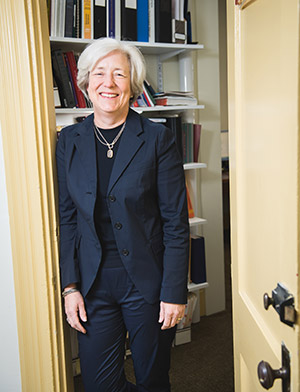Center for Innovation in Social Work & Health Director Named
Interim director Sally Bachman appointed to permanent post

Sara “Sally” Bachman has been named the first director of a cutting-edge BU center applying the insights of social work to national and global health care.
Bachman, who had been serving as interim director of the Center for Innovation in Social Work & Health (CISWH) since its 2015 launch, is a School of Public Health research professor of social research and of health law, policy, and management. As the CISWH’s first director, she also becomes the first Paul Farmer Professor at the School of Social Work, which oversees the CISWH. The center fosters collaboration between the two schools, as well as among other BU faculty.
“I could not be more excited and humbled by this amazing opportunity,” Bachman says of her two-year term as director, which is renewable.
“I will work with a talented group of colleagues to build the evidence base related to the value of social work practice in health and public health settings, from a cost and outcome perspective,” she says. The dual role of CISWH director and the new Paul Farmer Professorship “represents an ideal personal and professional challenge that will allow me to both leverage my skills and knowledge and continue to grow as a social work–public health leader.”
The CISWH’s mission is to use social work to reduce health care costs and improve care, particularly for underserved populations. The center’s premise is that in order to provide preventive health care, doctors and other caregivers need to know family and neighborhood influences that can impair health, especially for medically underserved populations. Social workers know that kind of information, which might help address domestic health problems such as the less-than-impressive US longevity rates and chronic disease prevention vis-à-vis other developed countries.
The CISWH has undertaken several projects since it was created through an anonymous $12.5 million gift. Bachman convened seven “learning communities”—BU faculty, students, and alumni and government, foundation, health care, and social work practitioners, among others—to produce a series of papers on how to leverage social work and health care in education, communications, and community and in global health. Those papers are under review for publication in a special edition of the American Journal of Public Health. She says that 200 people attended a symposium last year on the research by the learning communities.
Other initiatives have included the creation of fellowships for students studying for a master’s in social work, which provide summer health-related work as well as participation in the learning communities. Bachman has worked on a series to bring speakers to campus to discuss health care equity and social influences on health.
Bachman, who holds a PhD from Brandeis, has previously directed SSW’s doctoral program and chaired its research department. For the past six years, she has headed the Charles River Campus Institutional Review Board, which safeguards the rights and well-being of humans serving as research subjects. Her own research includes a project supporting the Catalyst Center, the National Center for Health Insurance and Financing for Children and Youth with Special Health Care Needs, and another study on using community health workers to improve HIV care. Both studies are funded by the federal Health Resources and Services Administration.
“We believe strongly in the CISWH’s potential to have tremendous impact on the study and practice of social work, advancing important interdisciplinary collaborations and innovative new approaches to some of the great challenges we face in health care delivery,” says Jean Morrison, provost and chief academic officer. “Sally Bachman has served as interim director since the center’s opening, and we are delighted to recognize her leadership with this appointment. We are also grateful for the extraordinary generosity and vision of our donor in recognizing the importance of this moment in health care and Boston University’s capacity to be a leader in this arena.”

Comments & Discussion
Boston University moderates comments to facilitate an informed, substantive, civil conversation. Abusive, profane, self-promotional, misleading, incoherent or off-topic comments will be rejected. Moderators are staffed during regular business hours (EST) and can only accept comments written in English. Statistics or facts must include a citation or a link to the citation.